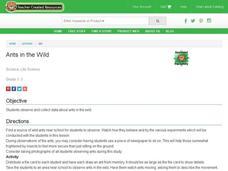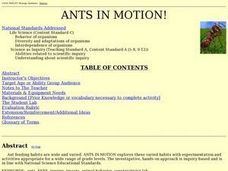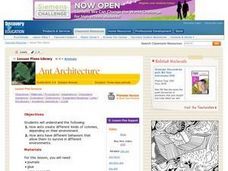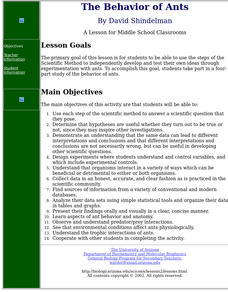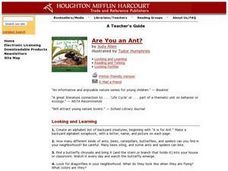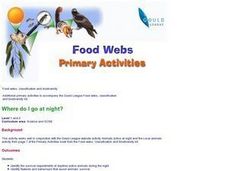Curated OER
When Ants Fly
Here is a great lesson on constructing line graphs. Learners identify common characteristics of birds, ants common needs of all living things. They also write a story from the perspective of an ant or a bird that has lost its home and...
Curated OER
Ants in the Wild
Students investigate ants in the wild. In this insect lesson plan, students observe ant colonies and conduct experiments, such as putting food in the ants' path. Students record their observations.
Curated OER
Buoyant Behavior
Combine science and literature with this lesson on buoyancy. Read There's an Ant in Anthony by Bernard Most to examine words containing the letters a, n, and t. Then introduce your class to the word "buoyant." Demonstrate how an egg...
Curated OER
Ants In Motion
Students brainstorm ants and their characteristics in a class discussion. They observe the ants and answer question pertaining to their behavior; then they apply the scientific method in creating and investigating a problem.
Houghton Mifflin Harcourt
Zombie Ants
One of the creepiest and coolest natural occurrences is a great forum for data analysis and discussion! Explore the phenomenon of zombie ants, or ants infected with the Cordyceps fungus, with a series of activities and experiments. Kids...
Curated OER
Ant Arcitecture
Students create pages of a classroom book on the different structures that ants build. They view and discuss a video on ants then, in small groups, research a type of ant shelter. They relate the shelter to the environment in which the...
Curated OER
The Behavior of Ants
Young scholars use the steps of the Scientific Method to develop and test their own ideas through experimentation with ants.
Curated OER
Are You an Ant?
Students investigate different insects in their backyard. In this insect lesson, students read the book Are You and Ant? and apply the reading to their backyards. Students create a list of animals that begin with the the letter A an make...
Curated OER
Insects: Bug Off
Students design and conduct an experiment to test three organic pesticides to control ants. They view a video that demonstrates ant behavior and the role of pesticides in insect control. In small groups, they set up behavior...
Curated OER
Little Me in a Big World: Ants
Students use the life cycle of an ant to learn about their own self-esteem. In this self-esteem lesson, students read books about ants and discuss obstacles from the stories as well as the ant behavior.
Curated OER
The Queen's Empire
Learners conduct Internet research on a variety of ant species and their habitats. They have an opportunity to observe ants in their environment. Areas of interest might include ant identification, colony life, the ant life cycle, and...
Curated OER
Ant Farm
Students explore the value of insects in the natural world. In this insect lesson, students examine species of insects, collect and record data, and analyze the data.
Curated OER
Cupcake Carry-out Coloring Page
In this coloring page worksheet, students examine a drawing of a colony of ants cooperating to carry off a large cupcake. Students color the picture.
Curated OER
Ants Have Feelings, Too!
Students consider how they show respect for others. For this service learning lesson, students listen and respond to literature from different perspectives.
Curated OER
Where Do I Go At Night?
Learners describe the requirements of daytime and nightime animals for survival. They identify any behaviors that assist in the animal surviving. They create a representation for the class to view.
Curated OER
The Greatest Show on Earth: The World's Smallest Animals
Students create instruments to capture different types of insects. In this The Greatest Show on Earth: The World's Smallest Animals lesson, students compare the attributes of certain insects and record the data on a chart. After catching...
Curated OER
Note Taking
Second graders work in groups to gather information from a factual paragraph on the topic of ants. They demonstrate taking notes by selecting 3 or 4 important key words in each sentence and write it on a note card to compile summary...
Curated OER
Teamwork Hill
Students receive a class score of 1-5 for appropriate behavior and participation during P.E. class. When class exits P.E., they move the class ant to a different fruit or vegetable. Each piece of food is worth 5 points, so some may be in...
Curated OER
A Day in the Life
Students use their research skills to investigate the behavior and characteristics of a rainforest animal. After creating a diary entry, they illustrate the habits and life cycle of the animal. They write the diary entry from the point...
Curated OER
Adaptations To the Environment
Students design and construct an imaginary animal that is perfectly adapted to a particular type of biome. They give the animal a scientific name, place it in a phylum and write descriptions about its behavior, reproduction, foraging,...
Curated OER
Household Pests
Sixth graders discover the various habitat requirements for assorted household pests from ants to wasps. They conduct various activities including researching the life cycles moths, cockroaches, and mosquitoes
Houghton Mifflin Harcourt
Amazing Animals: English Language Development Lessons (Theme 4)
This packet, the second in the series of support materials for the Houghton Mifflin Harcourt thematic units on amazing animals, contains exercises and activities designed for the ESL/ELD classroom.
EnLiST
Trap Your Own Insects: What’s in Your Backyard?
Young entomologists construct three types of insect traps—pitfall, pollinator, and panel—before setting their traps out and observing what they caught. They then observe what types of insects the different traps attract.
Curated OER
Different People/Different Times
Learners read and compare two selections by two different authors with the theme man vs. nature. They complete a literary analysis paper comparing and contrasting the author's treatment of the topic with emphasis on setting, historical...



